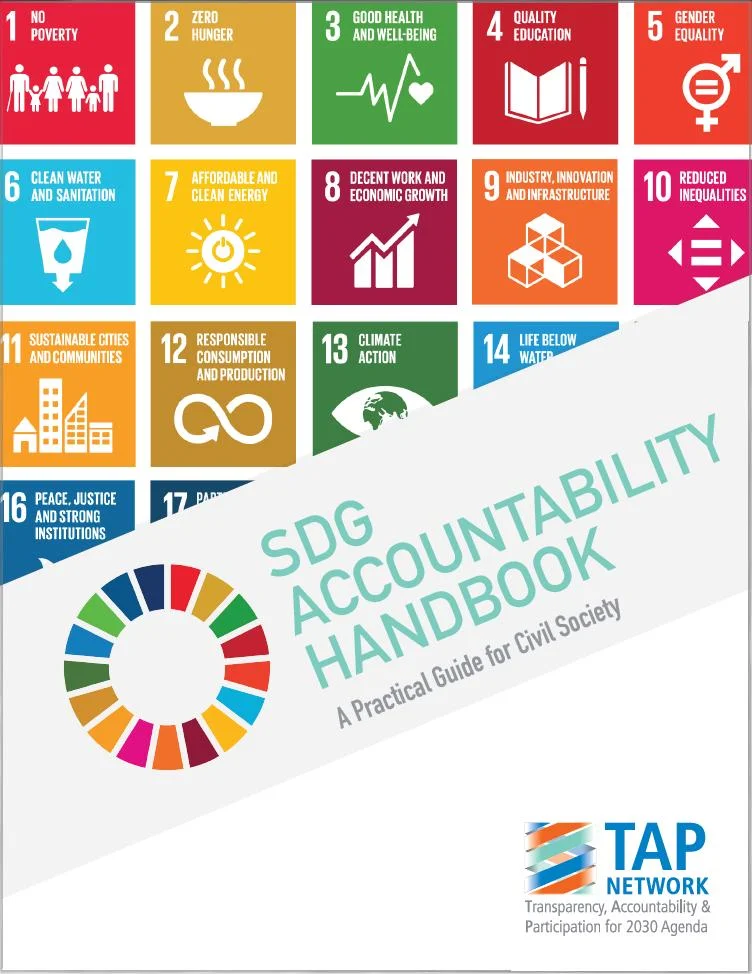On behalf of the TAP Network, we are excited to present this SDG Accountability Handbook. The year 2015 was a momentous occasion - governments came together to commit to a shared ambition and framework for a vision towards 2030 with the adoption of 2030 Agenda and accompanying SDGs.
Since the adoption of the SDGs, the world is markedly different, as global trends around the protection of civic freedoms and increased frequency and impunity of human rights abuses and other atrocities against civil society have been less than encouraging.
The 2030 Agenda and the SDGs must be seen as one of many opportunities to help fight back against these disturbing trends. Governments and other duty-bearers should be accountable for not only delivery of the basic goods and services outlined throughout the SDGs, but also effectively working to secure and preserve the fundamental human rights and dignity of all people, in all contexts. On this front, the SDGs’ commitment to leaving no one behind, and reaching those furthest behind first, has the potential to become a defining moral imperative of our time. Governments must be accountable to this foundational principle of the 2030 Agenda, if any progress is to be made on any of the 17 SDGs, and towards all of them.
Civil society has an important role to play in helping to deliver and ensure government accountability for the SDGs. We hope that this Handbook will enable civil society to pursue accountability for the SDGs in an informed, efficient and effective manner that will, in turn, lead to greater accountability and positive action by governments in implementing the 2030 Agenda. Recognizing that accountability is a shared endeavour, this Handbook builds on a wide range of resources, many of which have been produced by organizations of the TAP Network, and beyond.
Our aim for the Handbook is for it to serve as a practical resource for both civil society well acquainted with accountability processes for the 2030 Agenda, as well as those who are just beginning to consider how to drive government accountability for the SDGs. In addition to outlining broad approaches to support government accountability for the SDGs and the 2030 Agenda, the Handbook also includes practical tips to take into account when considering your own approaches.
Finally, the Handbook includes case studies that showcase best practices and examples of approaches that can be replicated for SDG accountability in different contexts, which we hope will enable colleagues to learn from one another.
Despite the ambitious commitments made through the 2030 Agenda, and immense challenges that the international community will inevitably face to implement the SDGs at all levels, we are as confident that the SDGs have set a course that will enable us to deliver on the 2030 Agenda’s promise to “transforming our world,” and lay a strong foundation on which future generations can continue to build.
We hope that this Handbook will provide a foundation for civil society’s ongoing work to drive government accountability for the SDGs and other related commit-ments. You can count on the TAP Network to collectively support efforts towards SDG accountability at all levels, and we hope you’ll see this resource as a useful stepping stone for this important work between now and 2030.
About the TAP Network
The Transparency, Accountability & Participation (TAP) Network is a broad network of civil society organisations (CSOs) that works to ensure that open, inclusive, accountable, effective governance and peaceful societies are at the heart of the 2030 Agenda for Sustainable Development, and that civil society are recognized and mobilized as indispensable partners in the design, implementation of and accountability for sustainable development policies, at all levels.
The TAP Network engages some of the foremost expert organizations on the issues around accountability for the 2030 Agenda, as well as Goal 16 of the Sustainable Development Goals (SDGs): ‘to promote peaceful, inclusive societies for sustainable development, to provide access to justice for all and to build effective, accountable and inclusive institutions at all levels.’ TAP benefits from the invaluable expertise, experiences and unique perspectives of its members, all of whom come together to collaborate under the TAP Network umbrella. This work is underpinned by recognition that we maximize reach and influence when many stakeholders speak with a unified voice.
Vision
TAP’s vision for the 2030 Agenda is framed by notions of rule of law and the TAP principles of transparency, accountability and citizen participation, as well as respect for human rights. Effective governance and sustained peace in a post-2015 world require transparent, participatory and inclusive institutions that are accountable to the very people that the 2030 Agenda has committed to engage.
The TAP Network is united in the belief that open, inclusive, accountable and effective governance and peaceful societies are both outcomes and enablers of sustainable and equitable development. The 2030 Agenda must promote openness, accountability and effective public institutions, build trust between states and their citizens, lay the foundation for peaceful and just societies and empower civil society to engage in the design, implementation and accountability of public policies at all levels.
TAP’s work also reflects the will and impetus of the millions of citizens from around the world who voted for ‘an honest and responsive government’ as one of their top priorities in the MY World survey—a theme echoed in consultations around the world throughout the 2030 Agenda negotiation process.

